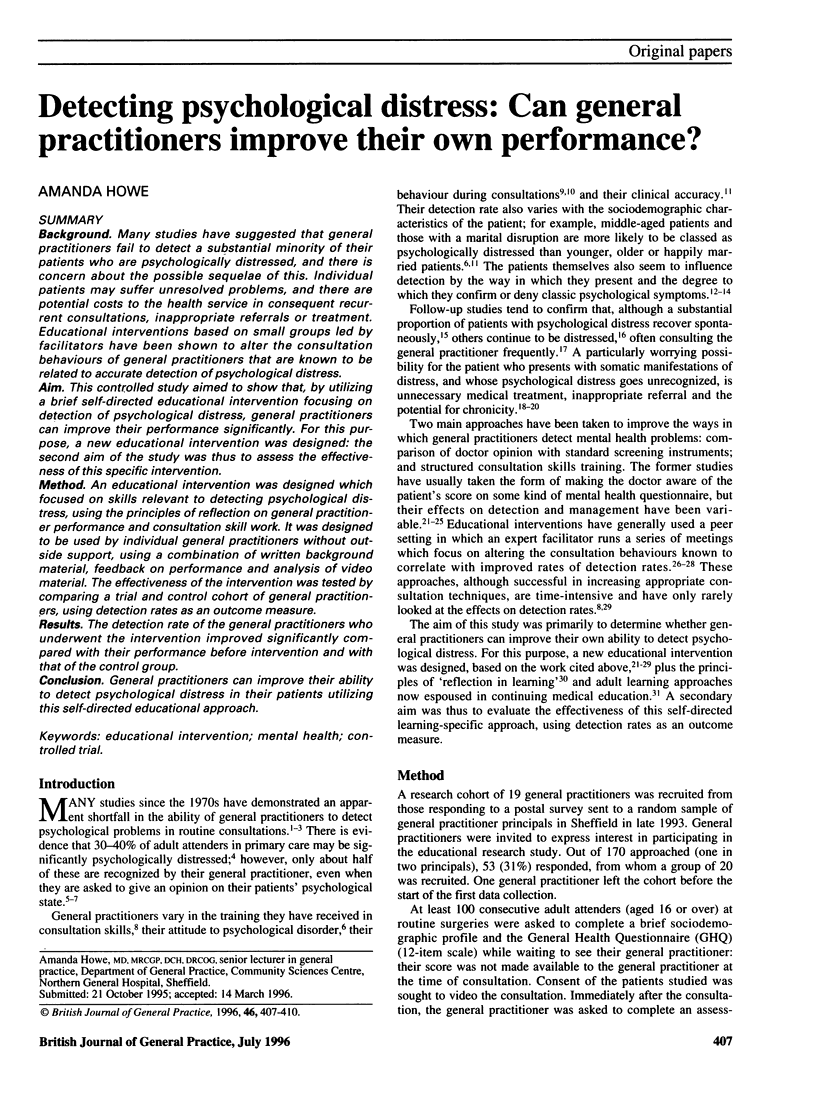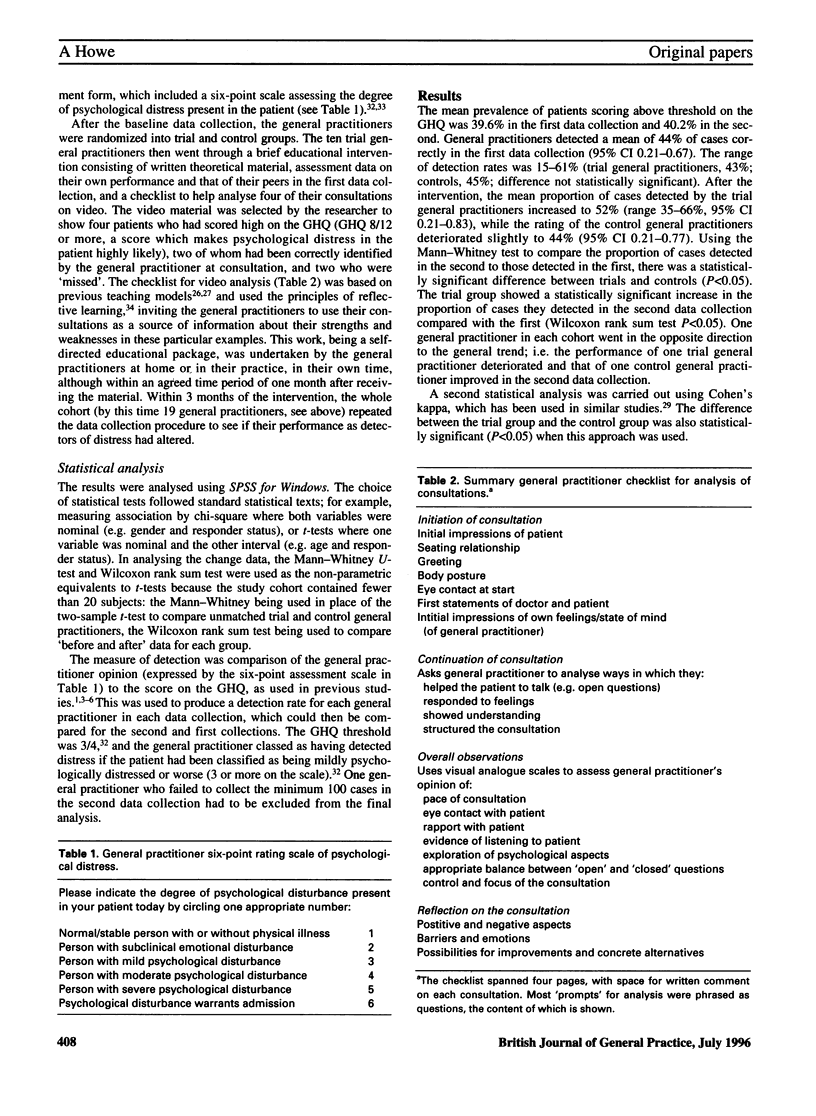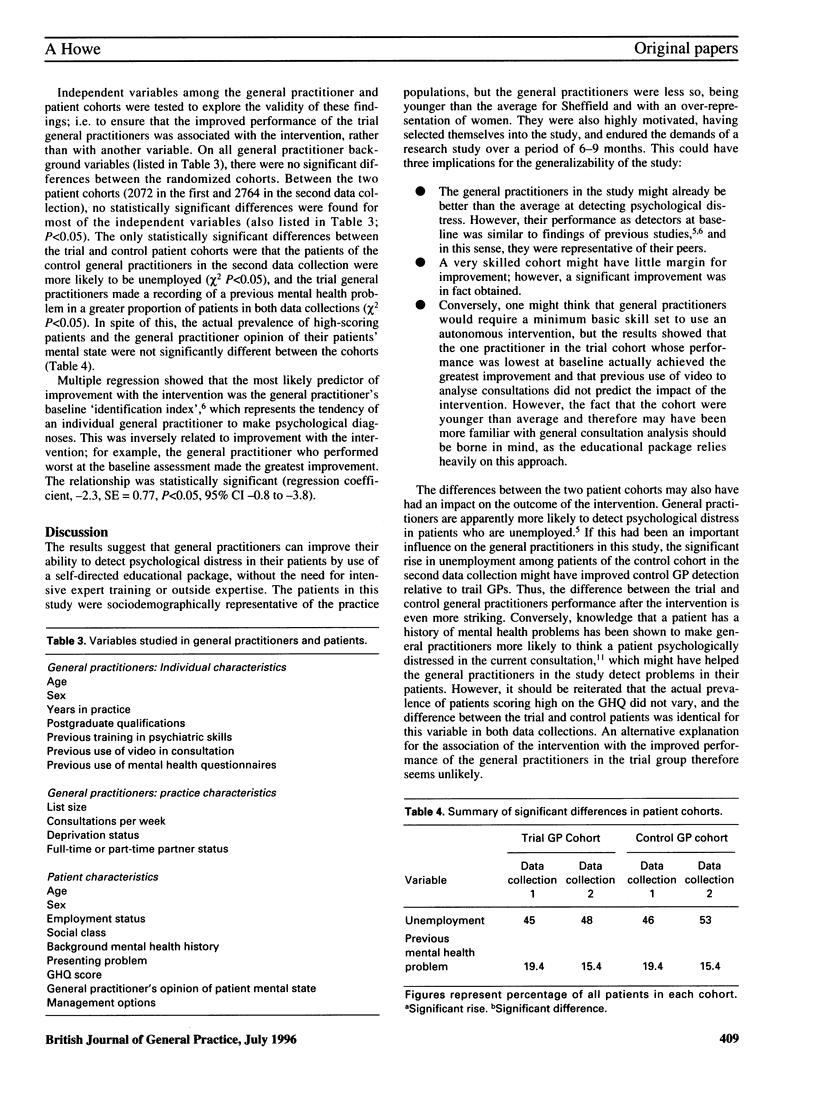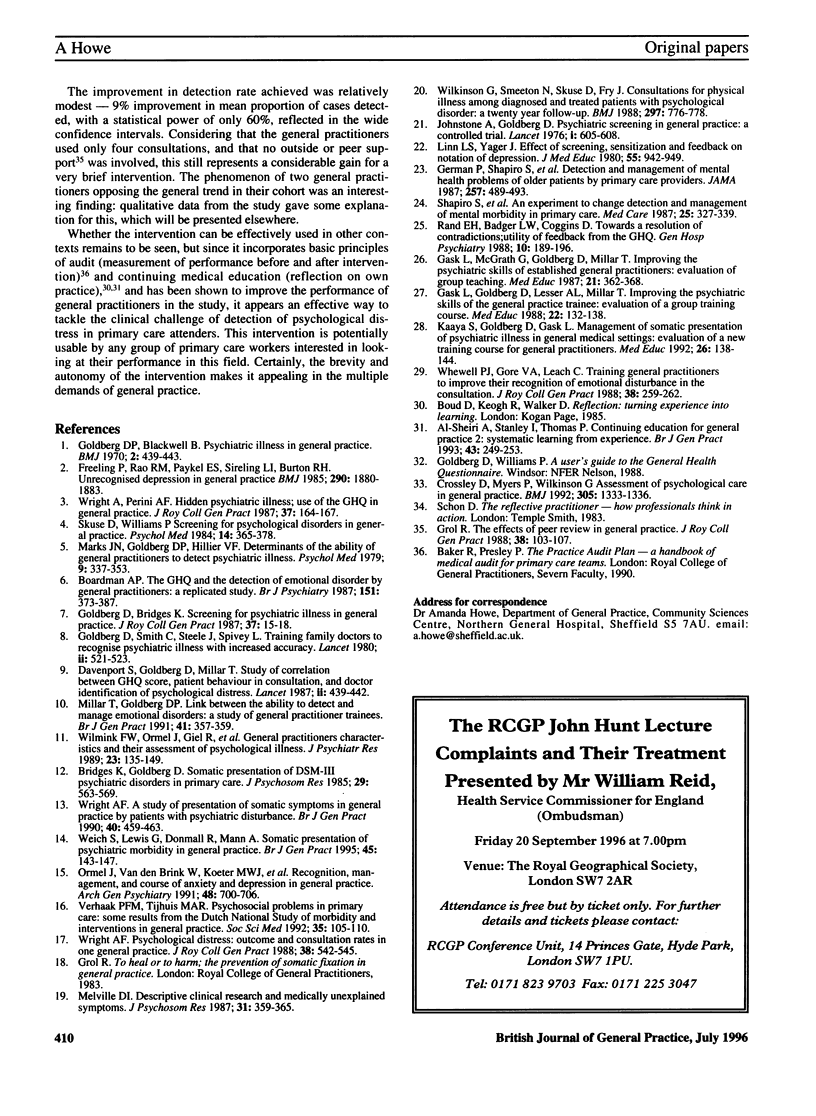Abstract
BACKGROUND: Many studies have suggested that general practitioners fail to detect a substantial minority of their patients who are psychologically distressed, and there is concern about the possible sequelae of this. Individual patients may suffer unresolved problems, and there are potential costs to the health service in consequent recurrent consultations, inappropriate referrals or treatment. Educational interventions based on small groups led by facilitators have been shown to alter the consultation behaviours of general practitioners that are known to be related to accurate detection of psychological distress. AIM: This controlled study aimed to show that, by utilizing a brief self-directed educational intervention focusing on detection of psychological distress, general practitioners can improve their performance significantly. For this purpose, a new educational intervention was designed: the second aim of the study was thus to assess the effectiveness of this specific intervention. METHOD: An educational intervention was designed which focused on skills relevant to detecting psychological distress, using the principles of reflection on general practitioner performance and consultation skill work. It was designed to be used by individual general practitioners without outside support, using a combination of written background material, feedback on performance and analysis of video material. The effectiveness of the intervention was tested by comparing a trial and control cohort of general practitioners, using detection rates as an outcome measure. RESULTS: The detection rate of the general practitioners who underwent the intervention improved significantly compared with their performance before intervention and with that of the control group. CONCLUSION: General practitioners can improve their ability to detect psychological distress in their patients utilizing this self-directed educational approach.
Full text
PDF



Selected References
These references are in PubMed. This may not be the complete list of references from this article.
- Boardman A. P. The General Health Questionnaire and the detection of emotional disorder by General Practitioners. A replicated study. Br J Psychiatry. 1987 Sep;151:373–381. doi: 10.1192/bjp.151.3.373. [DOI] [PubMed] [Google Scholar]
- Bridges K. W., Goldberg D. P. Somatic presentation of DSM III psychiatric disorders in primary care. J Psychosom Res. 1985;29(6):563–569. doi: 10.1016/0022-3999(85)90064-9. [DOI] [PubMed] [Google Scholar]
- Crossley D., Myres M. P., Wilkinson G. Assessment of psychological care in general practice. BMJ. 1992 Nov 28;305(6865):1333–1336. doi: 10.1136/bmj.305.6865.1333. [DOI] [PMC free article] [PubMed] [Google Scholar]
- Davenport S., Goldberg D., Millar T. How psychiatric disorders are missed during medical consultations. Lancet. 1987 Aug 22;2(8556):439–441. doi: 10.1016/s0140-6736(87)90970-6. [DOI] [PubMed] [Google Scholar]
- Freeling P., Rao B. M., Paykel E. S., Sireling L. I., Burton R. H. Unrecognised depression in general practice. Br Med J (Clin Res Ed) 1985 Jun 22;290(6485):1880–1883. [PMC free article] [PubMed] [Google Scholar]
- Gask L., Goldberg D., Lesser A. L., Millar T. Improving the psychiatric skills of the general practice trainee: an evaluation of a group training course. Med Educ. 1988 Mar;22(2):132–138. doi: 10.1111/j.1365-2923.1988.tb00423.x. [DOI] [PubMed] [Google Scholar]
- Gask L., McGrath G., Goldberg D., Millar T. Improving the psychiatric skills of established general practitioners: evaluation of group teaching. Med Educ. 1987 Jul;21(4):362–368. doi: 10.1111/j.1365-2923.1987.tb00377.x. [DOI] [PubMed] [Google Scholar]
- German P. S., Shapiro S., Skinner E. A., Von Korff M., Klein L. E., Turner R. W., Teitelbaum M. L., Burke J., Burns B. J. Detection and management of mental health problems of older patients by primary care providers. JAMA. 1987 Jan 23;257(4):489–493. [PubMed] [Google Scholar]
- Goldberg D. P., Blackwell B. Psychiatric illness in general practice. A detailed study using a new method of case identification. Br Med J. 1970 May 23;1(5707):439–443. doi: 10.1136/bmj.2.5707.439. [DOI] [PMC free article] [PubMed] [Google Scholar]
- Goldberg D. P., Steele J. J., Smith C., Spivey L. Training family doctors to recognise psychiatric illness with increased accuracy. Lancet. 1980 Sep 6;2(8193):521–523. doi: 10.1016/s0140-6736(80)91843-7. [DOI] [PubMed] [Google Scholar]
- Goldberg D., Bridges K. Screening for psychiatric illness in general practice: the general practitioner versus the screening questionnaire. J R Coll Gen Pract. 1987 Jan;37(294):15–18. [PMC free article] [PubMed] [Google Scholar]
- Johnstone A., Goldberg D. Psychiatric screening in general practice. A controlled trial. Lancet. 1976 Mar 20;1(7960):605–608. doi: 10.1016/s0140-6736(76)90415-3. [DOI] [PubMed] [Google Scholar]
- Kaaya S., Goldberg D., Gask L. Management of somatic presentations of psychiatric illness in general medical settings: evaluation of a new training course for general practitioners. Med Educ. 1992 Mar;26(2):138–144. doi: 10.1111/j.1365-2923.1992.tb00139.x. [DOI] [PubMed] [Google Scholar]
- Linn L. S., Yager J. The effect of screening, sensitization, and feedback on notation of depression. J Med Educ. 1980 Nov;55(11):942–949. doi: 10.1097/00001888-198011000-00007. [DOI] [PubMed] [Google Scholar]
- Marks J. N., Goldberg D. P., Hillier V. F. Determinants of the ability of general practitioners to detect psychiatric illness. Psychol Med. 1979 May;9(2):337–353. doi: 10.1017/s0033291700030853. [DOI] [PubMed] [Google Scholar]
- Melville D. I. Descriptive clinical research and medically unexplained physical symptoms. J Psychosom Res. 1987;31(3):359–365. doi: 10.1016/0022-3999(87)90056-0. [DOI] [PubMed] [Google Scholar]
- Millar T., Goldberg D. P. Link between the ability to detect and manage emotional disorders: a study of general practitioner trainees. Br J Gen Pract. 1991 Sep;41(350):357–359. [PMC free article] [PubMed] [Google Scholar]
- Ormel J., Koeter M. W., van den Brink W., van de Willige G. Recognition, management, and course of anxiety and depression in general practice. Arch Gen Psychiatry. 1991 Aug;48(8):700–706. doi: 10.1001/archpsyc.1991.01810320024004. [DOI] [PubMed] [Google Scholar]
- Rand E. H., Badger L. W., Coggins D. R. Toward a resolution of contradictions. Utility of feedback from the GHQ. Gen Hosp Psychiatry. 1988 May;10(3):189–196. doi: 10.1016/0163-8343(88)90018-7. [DOI] [PubMed] [Google Scholar]
- Shapiro S., German P. S., Skinner E. A., VonKorff M., Turner R. W., Klein L. E., Teitelbaum M. L., Kramer M., Burke J. D., Jr, Burns B. J. An experiment to change detection and management of mental morbidity in primary care. Med Care. 1987 Apr;25(4):327–339. doi: 10.1097/00005650-198704000-00006. [DOI] [PubMed] [Google Scholar]
- Skuse D., Williams P. Screening for psychiatric disorder in general practice. Psychol Med. 1984 May;14(2):365–377. doi: 10.1017/s0033291700003615. [DOI] [PubMed] [Google Scholar]
- Verhaak P. F., Tijhuis M. A. Psychosocial problems in primary care: some results from the Dutch National Study of Morbidity and Interventions in General Practice. Soc Sci Med. 1992 Jul;35(2):105–110. doi: 10.1016/0277-9536(92)90157-l. [DOI] [PubMed] [Google Scholar]
- Weich S., Lewis G., Donmall R., Mann A. Somatic presentation of psychiatric morbidity in general practice. Br J Gen Pract. 1995 Mar;45(392):143–147. [PMC free article] [PubMed] [Google Scholar]
- Whewell P. J., Gore V. A., Leach C. Training general practitioners to improve their recognition of emotional disturbance in the consultation. J R Coll Gen Pract. 1988 Jun;38(311):259–262. [PMC free article] [PubMed] [Google Scholar]
- Wilkinson G., Smeeton N., Skuse D., Fry J. Consultation for physical illnesses by patients diagnosed and treated for psychiatric disorders by a general practitioner: 20 year follow up study. BMJ. 1988 Sep 24;297(6651):776–778. doi: 10.1136/bmj.297.6651.776. [DOI] [PMC free article] [PubMed] [Google Scholar]
- Wilmink F. W., Ormel J., Giel R., Krol B., Lindeboom E. G., van der Meer K., Soeteman J. H. General practitioners' characteristics and the assessment of psychiatric illness. J Psychiatr Res. 1989;23(2):135–149. doi: 10.1016/0022-3956(89)90004-6. [DOI] [PubMed] [Google Scholar]
- Wright A. F. A study of the presentation of somatic symptoms in general practice by patients with psychiatric disturbance. Br J Gen Pract. 1990 Nov;40(340):459–463. [PMC free article] [PubMed] [Google Scholar]
- Wright A. F., Perini A. F. Hidden psychiatric illness: use of the general health questionnaire in general practice. J R Coll Gen Pract. 1987 Apr;37(297):164–167. [PMC free article] [PubMed] [Google Scholar]
- Wright A. F. Psychological distress: outcome and consultation rates in one general practice. J R Coll Gen Pract. 1988 Dec;38(317):542–545. [PMC free article] [PubMed] [Google Scholar]
- al-Shehri A., Stanley I., Thomas P. Continuing education for general practice. 2. Systematic learning from experience. Br J Gen Pract. 1993 Jun;43(371):249–253. [PMC free article] [PubMed] [Google Scholar]


